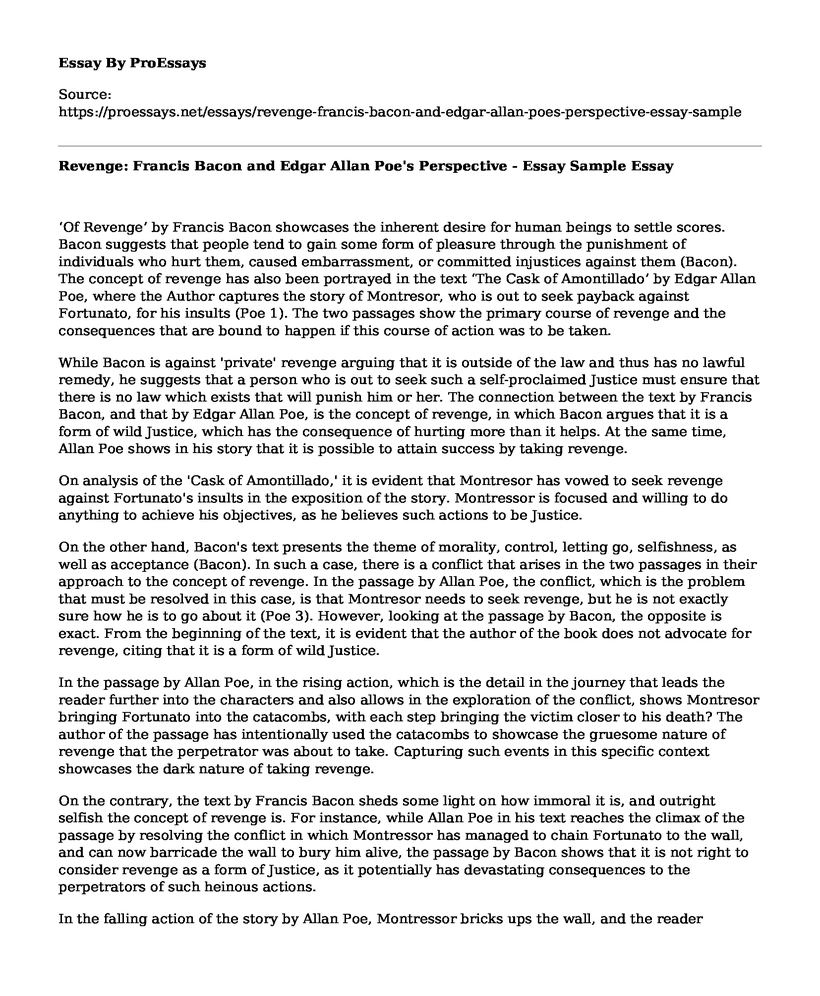‘Of Revenge’ by Francis Bacon showcases the inherent desire for human beings to settle scores. Bacon suggests that people tend to gain some form of pleasure through the punishment of individuals who hurt them, caused embarrassment, or committed injustices against them (Bacon). The concept of revenge has also been portrayed in the text ‘The Cask of Amontillado’ by Edgar Allan Poe, where the Author captures the story of Montresor, who is out to seek payback against Fortunato, for his insults (Poe 1). The two passages show the primary course of revenge and the consequences that are bound to happen if this course of action was to be taken.
While Bacon is against 'private' revenge arguing that it is outside of the law and thus has no lawful remedy, he suggests that a person who is out to seek such a self-proclaimed Justice must ensure that there is no law which exists that will punish him or her. The connection between the text by Francis Bacon, and that by Edgar Allan Poe, is the concept of revenge, in which Bacon argues that it is a form of wild Justice, which has the consequence of hurting more than it helps. At the same time, Allan Poe shows in his story that it is possible to attain success by taking revenge.
On analysis of the 'Cask of Amontillado,' it is evident that Montresor has vowed to seek revenge against Fortunato's insults in the exposition of the story. Montressor is focused and willing to do anything to achieve his objectives, as he believes such actions to be Justice.
On the other hand, Bacon's text presents the theme of morality, control, letting go, selfishness, as well as acceptance (Bacon). In such a case, there is a conflict that arises in the two passages in their approach to the concept of revenge. In the passage by Allan Poe, the conflict, which is the problem that must be resolved in this case, is that Montresor needs to seek revenge, but he is not exactly sure how he is to go about it (Poe 3). However, looking at the passage by Bacon, the opposite is exact. From the beginning of the text, it is evident that the author of the book does not advocate for revenge, citing that it is a form of wild Justice.
In the passage by Allan Poe, in the rising action, which is the detail in the journey that leads the reader further into the characters and also allows in the exploration of the conflict, shows Montresor bringing Fortunato into the catacombs, with each step bringing the victim closer to his death? The author of the passage has intentionally used the catacombs to showcase the gruesome nature of revenge that the perpetrator was about to take. Capturing such events in this specific context showcases the dark nature of taking revenge.
On the contrary, the text by Francis Bacon sheds some light on how immoral it is, and outright selfish the concept of revenge is. For instance, while Allan Poe in his text reaches the climax of the passage by resolving the conflict in which Montressor has managed to chain Fortunato to the wall, and can now barricade the wall to bury him alive, the passage by Bacon shows that it is not right to consider revenge as a form of Justice, as it potentially has devastating consequences to the perpetrators of such heinous actions.
In the falling action of the story by Allan Poe, Montressor bricks ups the wall, and the reader understands that it is all over for Fortunato, noting the irony in his name (There is nothing fortunate about him, as he ends up being the victim of revenge). It is also brought to light that the events occurred fifty years ago, and since Montressor is still alive, it signifies success in his endeavors. However, looking at the same scenario from Bacon's passage, it is clear to see that indeed revenge would not have been a good way to go about in the resolution of the issues between the two protagonists in the story by Allan Poe.
Conclusion
In conclusion, the two passages showcase similarities in terms of the theme of revenge, but how the concept has been approached by each writer is different. While Bacon argues that revenge is a form of wild Justice, which has the consequence of hurting more than it helps, Allan Poe shows in his story, that it is possible to attain success by taking revenge. At the end of it all, it is crucial to note that both approaches are critical in the attainment of Justice according to one’s perspective, as well as particular circumstances. For example, Allan Poe shows that a person may opt to take up the course of revenge and end up being successful in their endeavors like Montressor, but on the contrary, following the advice by Francis Bacon, then it would be a wrong move by Montressor, to commit the same actions.
Works Cited
Bacon, Francis. Of Revenge. 1652. 26 May 2020.
Poe, Edgar Allan. "The Cask of Amontillado." Elegant Ebooks (1846): 1-10.
Cite this page
Revenge: Francis Bacon and Edgar Allan Poe's Perspective - Essay Sample. (2023, Aug 14). Retrieved from https://proessays.net/essays/revenge-francis-bacon-and-edgar-allan-poes-perspective-essay-sample
If you are the original author of this essay and no longer wish to have it published on the ProEssays website, please click below to request its removal:
- Just Mercy Book Review
- Literary Analysis Essay on Hamlet
- Violence in Elkins' Imperial Reckoning Essay Example
- Literary Analysis Essay on Similarities Between Brain on Fire and Ten Days in a Madhouse
- Andrew Marvell and His Poems: An Analysis Essay
- Essay Sample: The Theme of Power in Richard III
- 1984: Government Control, Rebellion, and Human Nature - Book Analysis Essay







